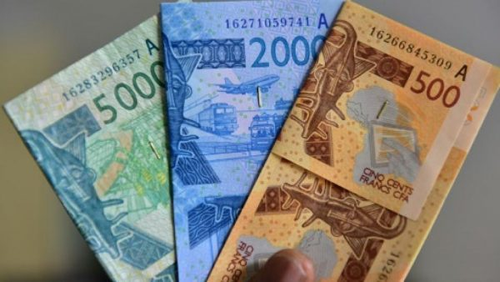The West African currency, CFA Franc, has crashed against the Naira to a new record low at the black market trading at 10,000 CFA early Wednesday to N5,850 due to the closure of Nigeria’s land borders.
Our correspondent who was at Seme border learnt from some local Bureau de change operators that before the closure of the border, 10,000 CFA was sold at the rate of N6000 as against the present N5,850.
But traders and residents at the Seme border told Daily Trust that the prices of some commodities still witnessed a slight increase at the Benin Republic side of the border while the reverse is the case in Nigeria.
All the nation’s land borders were shut at the instance of a directive from the Office of the National Security Adviser (NSA) owing to the state of insecurity in the country.
Currently, the CFA had depreciated at the black market to 1000 CFA/N585 at some local sales outlet and N580 at another.
The price per bag of a 50kg bag of rice which sold for between N10,000 and N11,500 crashed to between N9000 and N9500 depending on the brand.
But the reverse is the case in Nigeria as investigation showed that whereas rice smuggling through the land borders has been effectively reduced, it has forced the market price of the commodity to surge from N14,000 or N18,000 to N19,000 per bag as at Wednesday.
Consequently, smuggling through the waterways had never been so enticing as the smugglers understand that the only force they have to contend with is the Nigerian Navy, but whose primary and secondary concerns were crude theft prevention and seizure of adulterated diesels, instead of rice smuggling.
Economic and financial experts are however divided over the outlook for the Naira throughout the remaining part of the year; many have said the local currency may depreciate further in the coming months if the nation’s borders remain closed beyond the stipulated 28 days mapped out for the ongoing joint exercise code named ‘Exercise Swift Response’.
Also, according to a bureau de change source, currency traders were taken unaware by the new development.
One of the Bureau de change operators popularly known as BCB said that a 1000 CFA note was sold at the rate of N600 before the closure in August, a difference of N20.
“This rate can change any moment depending on the demand for CFA by travellers. They are the determining factor. Our currency changes from time to time depending on demand and supply.
“Honestly business has witnessed a downward slide since the closure of the border was announced by the Nigerian u” he added.
Another operator, Koti Pauline defers a little from BCB as he explained that in his office, 1000 CFA goes for N580, a difference of N50 between the two offices.
He said that he makes his profit from the volume of cash sold on a daily bases.
“To me this is a business strategy to Increase the traffic of customers to my office. Travellers and traders alike take into consideration this small figure when making their travel expense” he added.
Dansis Dansu, another Bureau de change operator at Seme said that 10,000 CFA goes for N5,850.
However, the downward slide, according to the operators started gradually. They said that the slide started from N600 to N590 and that right now it has further plunged to the present N580 or N585 depending on the sales outlet.
Interestingly, the prices of goods at the Benin Republic side of the border have remain the same since the beginning of the joint security exercise that led to the border closure.
The Nigeria Customs Service (NCS) exercise, with backup of the Joint Security Taskforce flagged off few days back, may have successfully achieved a water-tight, anti-smuggling land border closure, forcing smugglers to take to the sea instead. (Daily Trust)
Trending Now
Bruce Leung, who appeared in Kung Fu Hustle, passes at 77
Veteran Hong Kong martial artist and actor Bruce Leung, also known as Leung Siu-lung, has passed away at the age of 77.
According to reports from Hong Kong media,...
US attack on ISWAP fighters in Sokoto, a cover-up,’ Gumi replies Shehu Sani
Controversial Islamic scholar, Sheikh Ahmad Gumi, has told former lawmaker who represented Kaduna Central senatorial district in the National Assembly, Shehu Sani that the...
Ijaw leaders urge APC to save Fubara from impeachment
The Ijaw National Congress (INC), the umbrella socio-cultural body of the Ijaw people in the Niger Delta, has urged the All Progressives Congress (APC)...
ADC demands transparency on Nigeria–US health pact
The African Democratic Congress (ADC) has urged the Federal Government to publish the full text of the recently signed Nigeria–United States health cooperation agreement,...
WEF: Nigeria to showcase four economic playbooks at Davos
Vice President Kashim Shettima has arrived in Davos, Switzerland, to lead Nigeria’s delegation at the 56th Annual Meeting of the World Economic Forum, holding...
Doubts about Nigeria’s inflation data threaten investors’ confidence – CPPE
A looming threat to investors’ confidence has emerged as the Centre for the Promotion of Private Enterprise (CPPE) has raised concerns about recent changes...
Ijaw leaders urge APC to save Fubara from impeachment
The Ijaw National Congress (INC), the umbrella socio-cultural body of the Ijaw people in the Niger Delta, has urged the All Progressives Congress (APC)...
US attack on ISWAP fighters in Sokoto, a cover-up,’ Gumi replies...
Controversial Islamic scholar, Sheikh Ahmad Gumi, has told former lawmaker who represented Kaduna Central senatorial district in the National Assembly, Shehu Sani that the...
ADC demands transparency on Nigeria–US health pact
The African Democratic Congress (ADC) has urged the Federal Government to publish the full text of the recently signed Nigeria–United States health cooperation agreement,...
Business
Sports
AFCON 2025; “To ginger them”- Peller promises Ademola Lookman N500k for every goal scored against Morocco
Popular Nigerian content creator and livestreamer, Peller has promised Super Eagles star, Ademola Lookman ₦500k ahead of the team’s match with Morocco.
The livestreamer announced...
Entertainment
Bruce Leung, who appeared in Kung Fu Hustle, passes at 77
Veteran Hong Kong martial artist and actor Bruce Leung, also known as Leung Siu-lung, has passed away at the age of 77.
According to reports from Hong Kong media,...


























